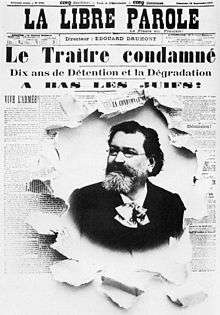Édouard Drumont

Édouard Adolphe Drumont (3 May 1844 – 5 February 1917) was a French journalist and writer. He founded the Antisemitic League of France in 1889, and was the founder and editor of the newspaper La Libre Parole. After spending years of research, he synthesized three major strands of antisemitism. The first strand was traditional Catholic attitudes toward the "Christ killers" augmented by vehement antipathy toward the French Revolution. The second strand was hostility to capitalism, of the sort promoted by the Socialist movement. The third strand was scientific racism, based on the argument that races have fixed characteristics, and the Jews have highly negative characteristics.[2]
Early life
Drumont was born in Paris in 1844 to a family of porcelain-painters from Lille. He lost his father at the age of seventeen, and had to care for himself and earn his own livelihood from then onwards.[3]
Public career
He first worked in government service, and later became a contributor to the press and was the author of a number of works, of which Mon vieux Paris (1879) was crowned by the French Academy.
Drumont's 1886 book, La France Juive (Jewish France), attacked the role of Jews in France and argued for their exclusion from society. In 1892, Drumont founded the newspaper the La Libre Parole which became a platform for virulent antisemitism. This newspaper came out against Diana Vaughan, an invention of Léo Taxil, before Taxil admitted that his anti-Masonic protégée did not exist in 1897. La Libre Parole preferred the 'seeress' Henriette Couedon.
In the national elections of May 1898 the antisemitic leader Max Régis supported Drumont in the elections to the national legislature in Algiers.[4] On 8 May 1898 Édouard Drumont was elected triumphantly with 11,557 votes against 2,328 and 1,741 for his opponents.[5] Of six Algerian national deputies, four were elected on the platform of Regis's Anti-Jewish League.[6] Drumont represented Algiers in the Chamber of Deputies from 1898 to 1902. He was sued for accusing a parliamentary deputy of having taken a bribe from the prominent Jewish banker Édouard Alphonse de Rothschild to pass a piece of legislation the banker wanted.
Drumont attracted many supporters and was one of the primary sources of antisemitic ideas that would later be embraced by Nazism.[7] He exploited the Panama Company Scandal[8] and reached the peak of his notoriety during the Dreyfus Affair, in which he was the most strident of Alfred Dreyfus' accusers.[3]
For his anti-Panama articles, Drumont was condemned to three months' imprisonment. In 1893 he was an unsuccessful candidate for the representation of Amiens; the following year he retired to Brussels. The Dreyfus affair helped him to regain popularity, and in 1898 he returned to France and was elected deputy for the first division of Algiers, but was defeated as a candidate for re-election in 1902.[3]
Works
- La fin d'un monde (1888)
- Dernière battaille (1890)
- Testament d'un antisémite (1891)
- Secret de fourmies (1892)
- De l'or, de la boue, du sang – Du Panama á l'anarchie (1896), dealing with the Panama scandals
- Les Juifs et l'affaire Dreyfus (1899)
- Vieux portraits, vieux cadres (1900)
La France juive
La France juive (Jewish France) (1886)
See also
References
- ↑ the day after Alfred Dreyfus had been convicted again on 9 September 1899 in Rennes
- ↑ Richard S. Levy, Antisemitism: A historical encyclopedia of prejudice and persecution (2005) 1:191
- 1 2 3 Deutsch, Gotthard, and A.M. Friedenberg. "DRUMONT, EDOUARD ADOLPHE, JewishEncyclopedia.com (accessed 9 November 2007).
- ↑ Benbassa 2001, p. 145.
- ↑ Bouveresse 2008, p. 492.
- ↑ Zack 2005, p. 594.
- ↑ Adam Keller; "In 1886 the French antisemite Edouard Drumont published 'La France Juive' ('Jewish France'), creating the false nightmarish image of a France dominated by Jews, and sowing the poisonous seeds which came to fruit when Vichy French officials collaborated in the mass murder of French Jewry" Drumont's Jewish disciple, 2 June 2008
- ↑ Arendt, Hannah. The Origins of Totalitarianism. Harvest Books, 1973; ISBN 0-15-670153-7, pp. 95-99.
Sources
- Benbassa, Esther (2001-07-02), The Jews of France: A History from Antiquity to the Present, Princeton University Press, ISBN 1-4008-2314-5, retrieved 2016-02-07
- Bouveresse, Jacques (2008), Un parlement colonial: les délégations financières algériennes, 1898-1945 (in French), Publication Univ Rouen Havre, ISBN 978-2-87775-876-5, retrieved 2016-02-07
- Zack, Lizabeth (2005), "Regis, Max (1873-1950)", Antisemitism: A Historical Encyclopedia of Prejudice and Persecution, ABC-CLIO, ISBN 978-1-85109-439-4, retrieved 2016-02-07
Further reading
- Anderson, Thomas P. "Edouard Drumont and the Origins of Modern Anti-Semitism." Catholic Historical Review (1967): 28-42. in JSTOR
- Busi, Frederick. The pope of antisemitism: the career and legacy of Edouard-Adolphe Drumont (University Press of America, 1986)
- Byrnes, R. F. "Edouard Drumont and La France Juive." Jewish Social Studies (1948): 165-184. in JSTOR
- Isser, Natalie. Antisemitism during the French Second Empire (1991) online
External links
|